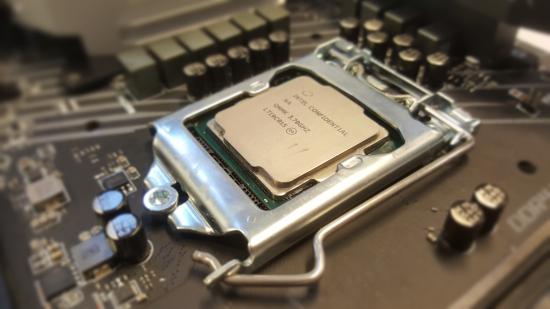Intel is rumoured to be implementing a new socket layout with Intel Comet Lake processors, putting an end to its current bout of cross-compatibility enjoyed across 8th and 9th Gen Coffee Lake processors and the Intel LGA 1151 V2 socket.
The Intel 400 series chipset was initially spotted within release notes for Intel’s chipset drivers, understandably following on from the 300 series, 200 series, and the 100 series. You get the picture. This confirmation in itself isn’t all that much to rave about. But according to serial leaker, Momomo_US, these new boards will utilise a different socket layout.
The LGA 1151 V1 socket goes way back to 6th Gen Skylake chips and 100 series motherboards, with the following 7th Gen Kaby Lake chips and 200 series motherboards also fitting neatly into this initial socket design. The current LGA 1151 V2 socket is fitted with 1,151 pins – the same pin count with an alternative configuration – and was introduced with 8th Gen Coffee Lake processors and later utilised for 9th Gen Coffee Lake processors, too.
And so the move towards a new socket with Comet Lake comes as no surprise. It’s Intel’s modus operandi after all, and motherboard manufacturers will be keen for the new business. But it does mean no six- to 10-core substitutions for us gamers.
[Rumor] ☄️S 🆕Socket (more pins) & 400 Series Chipsets.
— 188号 (@momomo_us) May 8, 2019
Comet Lake is expected to drop later this year with up to 10 cores and 20 threads. Intel previously cited power delivery as necessitating the LGA 1151 V2 socket – rather controversially, I might add – and it wouldn’t be all that surprising to see that same reasoning come into play here, too.
Comet Lake CPUs are also expected to feature totally succinct 10000 series name tags.
Want faster storage? These are the best SSDs for gaming today
Intel has announced that Ice Lake 10nm parts will be available mid-year in the mobile segment, with Computex set to serve up a slew of 10nm laptops at the Taipei show. Intel’s chipset drivers also shed light on the potential for a 495 series chipset catered toward these processors.
Desktop chips for us PC gamers aren’t expected to reach the 10nm process node until 2020, however, leaving Intel’s 14nm architecture to face down AMD Ryzen 3000 CPUs on the 7nm process node from TSMC come the end of the month.
